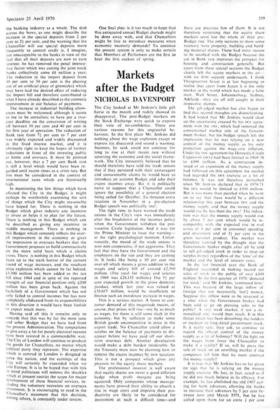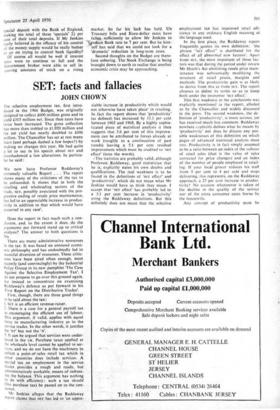Markets after the Budget
NICHOLAS DAVENPORT
The City looked at Mr Jenkins's little gift horse in the mouth and rudely showed its disapproval. The post-Budget markets on the Stock Exchange were quick to express their vote of no-confidence. There are various reasons for this ungrateful be- haviour. In the first place Mr. Jenkins did nothing about the wage explosion except to express his disaccord and sound a warning. Incomes, he said, could not continue for long to rise at their recent rate without upsetting the economy and the social frame- work. The City innocently believed that he should therefore have told the trade unions that if they persisted with their extravagent and unreasonable claims he would have to introduce an autumn Budget and take their excess incomes away. But it is politically naïve to suppose that a Chancellor could ignore the possibility of a general election being called for October. To threaten extra taxation in November in a pre-election Budget speech was politically 'out'.
The right time to have warned the trade unions in the City's view was immediately after the breakdown of the incomes policy when the Government withdrew the pro- vocative Castle legislation. And it was for the Prime Minister to issue the warning— at the right psychological moment. Unfor- tunately, the mood of the trade unions is now non-cooperative, if not aggressive. They feel that they have the Government and the employers on the run and they are cashing in. It looks like being a 10 per cent rise over-all which means a gross addition to the wages and salary bill of around £2,500 million. (The total for wages and salaries in 1969 was £24,135 million.) The 31 per cent expected growth in the gross domestic product, which last year was valued at £38,617 million, would be insufficient to finance such an inordinate increase in wages.
This is a serious matter. A boost to con- sumer demand of this magnitude means, of course, that prices will rise—not by as much as wages, for there is still some slack in the economy, but by sufficient to make some British goods uncompetitive in price in the export trade. No Chancellor could allow a surplus on the balance of payments to dis- appear before we have paid off our short- term overseas debt. Another devaluation would make a debt burden intolerable. So the Treasury must now be planning how to
remove the excess incomes by new taxation.
This is not a prospect which gives any pleasure to the equity share markets.
The professional investor is well aware that equity shares are never a good inflation hedge when profit margins are being squeezed. Only companies whose manage- ments have proved their ability to absorb a rise in wage costs and improve their pro- ductivity are likely to be considered for
investment at such a difficult time—and
there are precious few of them. it is not therefore surprising that the equity share markets soon lost the whole of their pre- Budget rise. The only sections to show some recovery were property, building and build- ing material shares. These had more reason to be satisfied with the Budget because the cut in Bank rate improves the prospect for housing and construction generally. But apart from these special sections the Budget clearly left the equity markets in the air— with no firm support underneath. I think Throgmorton Street is at last beginning to realise that apart from Japan it is the only market in the world which has made a false start. Wall Street, Johannesburg, Sydney, Adelaide—they are all still caught in their respective slumps.
The gilt-edged market has also begun to find that second thoughts are disenchanting. It had hoped that Mr Jenkins would clear up the uncertainty created by his DCE agree- ment with the IMF, which had removed the conventional market role of the Govern- ment broker, but his budget speech left the impression that he was relying on a new control of the money supply as his only protection against the wage-cost inflation. Under the IMI- agreement the Domestic Credit Expansion (DcE) had been limited in 1969-70 to £400 million. As a contraction in- stead of an expansion of the money supply had followed on this agreement the market had regarded the DCE exercise as a lot of boloney. It was not therefore perturbed when Mr Jenkins declared that in 1970-71 the DCE would be limited to 1900 million. But it was more than puzzled when he went on to say that there would be a different relationship this year between ncE and the money supply and that the money supply would rise by less than the oce! The indica- tion was that the money supply would rise by about 5 per cent which would be in- compatible with the expected rise in real terms of 4 per cent in consumer spending and im eminent and of 3f per cent in the gross national product. The market was therefore worried by the thought that the Government broker might after all be told to sell gilt-edged stock in order to mop up surplus money regardless of the 'tone' of the market and the level of interest rates.
In the last financial year the Bank of England succeeded in making record net sales of ,stock to the public of over £400 million. In the first quarter of 1970 'demand for stock.' said Mr Jenkins, 'continued firm.' This was because of the large inflow of foreign (hut not necessarily 'hot') money. Suppose this inflow were to be reversed at a time when the Government broker had been told to go on pressing sales to the public! A eery weak market, if not a de- moralised one, would then result. It is this threat which has been disturbing the holders of medium to long-dated government stock. Is it really safe. they ask, to continue to regard the official control of the money supply as a lot of boloney? Will the fight on the wages front force the Chancellor to make it a reality? If so, will he press the sale of stock on an unwilling market if the computers tell him that he must contract the money supply?
It is true that Mr Jenkins has so far given no sign that he is relying on the money supply exercise. He has, in fact, acted as if he did not much believe in its efficacy. For example, he has abolished the old 1967 ceil- ing for bank advances, allowing the banks to increase their advances by 5 per cent be- tween now and March 1971, but he has called upon them for an extra per cent
special deposit with the Bank of England, making the total of these 'specials' 2f per cent of their total deposits. If Mr Jenkins really believed in the efficacy of his control of the money supply would he really bother to go on trying to control bank liquidity?
Of course all would be well if interest rates were to continue to fall and the Government broker were able to sell in- creasing amounts of stock on a rising market. So far his luck has held. Us Treasury bills and Euro-dollar rates have fallen sufficiently to allow Mr Jenkins to Veduce Bank rate to 7 per cent. But he him- self has said that we could not look for a 'dramatic' reduction in long-term rates. Second thoughts on the Budget are there- fore sobering. The Stock Exchange is being brought down to earth to realise that another economic crisis may be approaching.







































 Previous page
Previous page